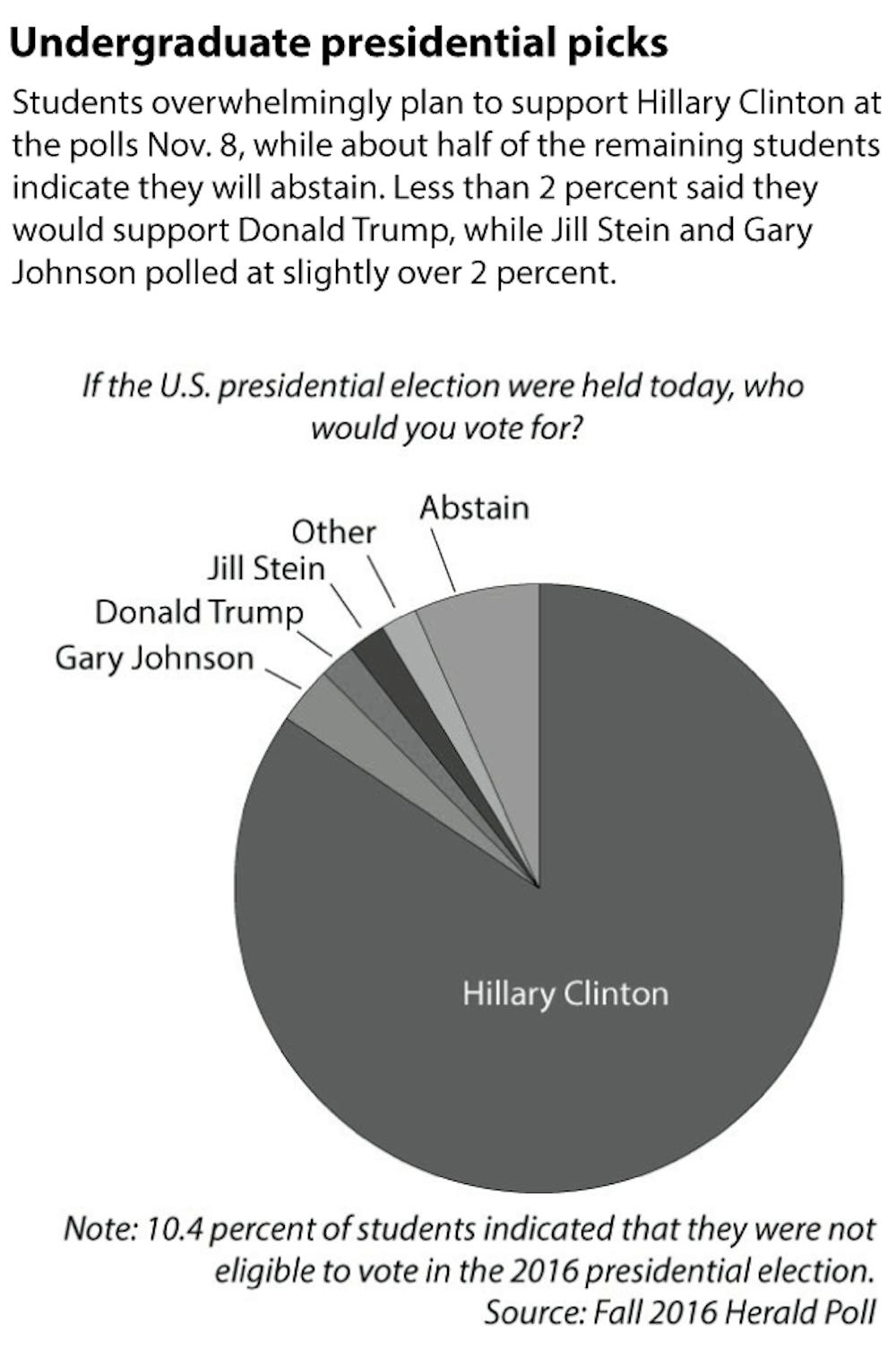With only a week until election day, many students have made their decisions as to whom they would like to see as president. An overwhelming majority — 85 percent — of undergraduate students surveyed in this semester’s Herald poll indicated that they would vote for Democratic presidential nominee Hillary Clinton. Political groups across campus are gearing up to get out the vote.
Brian Cohn ’17, president of the Brown Democrats, said the organization has worked in tandem with the Undergraduate Council of Students and Brown Students for Hillary to ensure voters are registered and have access to voter support system TurboVote and absentee ballots.
While there was a diversity of opinion regarding the Democratic candidates during the primaries, the group is now virtually united in endorsing and voting for Clinton, Cohn said. Clinton offers a mix of both pragmatic and progressive values as well as a wealth of experience in most sectors of government, he added.
In contrast, the Brown Republicans did not endorse their party’s candidate. Since only a third of the group’s members plan to vote for Trump, the group decided that the demonstrated support was insufficient for a group-wide endorsement, said Ethan Shire ’19, vice president of Brown Republicans.
While Trump enjoyed the plurality of votes among members of the group, the majority of members will be voting for other candidates — mainly Clinton or Libertarian Party candidate Gary Johnson — or will be abstaining altogether, Shire said.
Given the division on the presidential race, the members of Brown Republicans have focused their energy on senatorial races, especially that of U.S. Sen. Kelly Ayotte, R-NH, by canvassing and conducting phone banks. It is paramount that Republicans get behind candidates who earnestly espouse conservative principles on both the state and federal levels, even if they have not come to a decision on the presidential race, Shire said.
The election hinges on the support of millennials, who are the most socially active generation ever but also the least likely to vote, said James Morone, professor of public policy as well as political science and urban studies and director of the Taubman Center for American Politics and Policy. While frustration over this year’s election is completely valid, it is crucial that millenials vote regardless of their particular political persuasions, Morone added. “The generation that owns the future ought to shape it as well.”
While polls overwhelmingly point to a Clinton presidency, the nature of her potential victory is a contentious topic, Morone said. A decisive victory for Clinton would serve as a firm repudiation of Trump’s values. In contrast, a minor victory for Clinton would signal to future politicians that there is widespread grassroots support for Trump-style politics, he added.
Joelle Sherman ’19 and Jeffrey Salvadore ’17, coordinators for Brown Students for Hillary, said that while both the Herald poll and other preliminary polling results encouraged them, their organization is taking Republican presidential nominee Donald Trump very seriously and painstakingly avoiding complacency. Clinton “will not win if people do not actually head out to vote,” Sherman said.
In order to ensure students head out to vote, Brown Students for Hillary has been mobilizing and registering voters by promoting their candidate on social media and by canvassing — especially in the nearby swing state of New Hampshire.
While Brown Students for Bernie has provided its members with information to get involved with Clinton’s campaign, the group has not officially endorsed her.
Despite U.S. Sen. Bernie Sanders, I-VT, himself endorsing Clinton, the group decided not to endorse Clinton due to a lack of consensus, the priorities of the group and the belief that the group’s members had limited capacity to influence the election, said Aidan Calvelli ’19, one of the former student leaders of Brown Students for Bernie.
But Calvelli estimated that about half of the members of the group would be voting for Clinton. The group decided not to endorse anyone else, and Calvelli is confident that Sanders would ultimately prove not to have a “spoiler effect” for Clinton, he said.
Calvelli emphasized that, rather than encouraging students to vote for a particular candidate, the group pushed its members to be politically active after Sanders’ campaign ended by supporting progressive movements — whether moderate or radical.
Sherman and Salvadore said that while they could sympathize with frustrated voters, political apathy must be avoided at all costs. There are other legitimate ways to get politically involved besides voting, but they warned that this election could have massive effects on the course that this country will take.
Sherman and Salvadore suggested that alienated voters compare the candidates on the particular issues they find important, as there is much disagreement between the two candidates.
Morone emphasized that this election’s importance transcends that of usual elections because the divergence in the opinions and beliefs of the two major candidates is unprecedented, he said.
Beyond mere differences in opinions and standards of evidence, the election reflects fundamentally different visions for America in the 21st century, Morone said. Models predict the United States will be a “majority-minority nation” by the year 2040, and Trump may be a manifestation — or the final manifestation — of the backlash against this rapid cultural change, he added.





